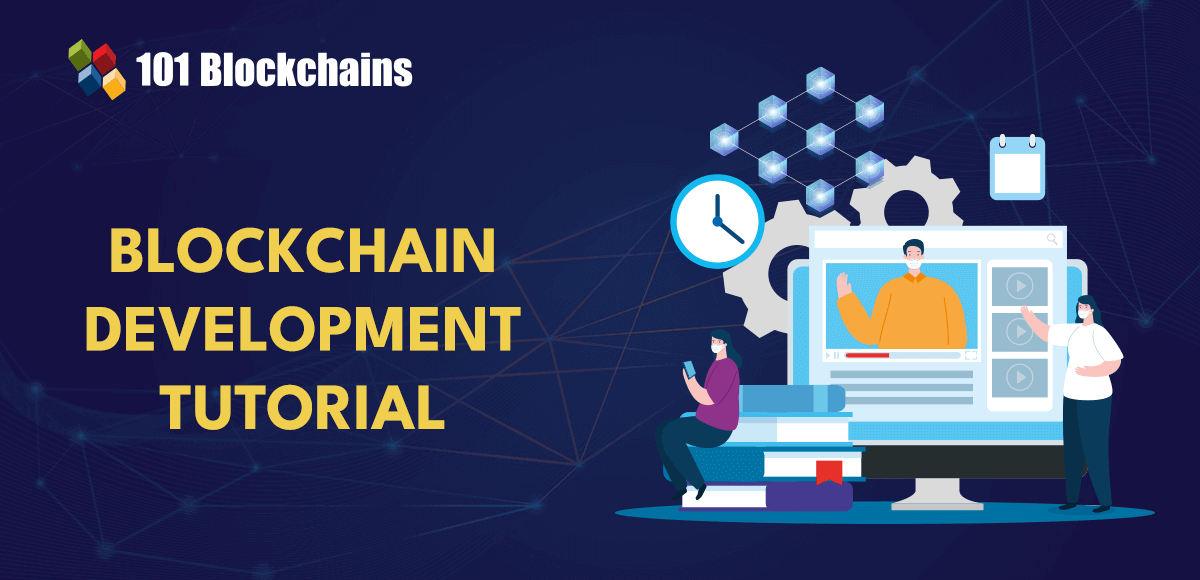Developer’s Guide to Blockchain Development

Blockchain technology has emerged as a significant force transforming traditional approaches to online interaction, transactions, and information exchange. Do you have coding, blockchain technology, or cryptography skills? If so, you need a blockchain development tutorial to build the skills needed to create new blockchain-based solutions. Blockchain has the ability to transform a variety of industries, including healthcare, finance, supply chain management, real estate, music, and art.
Therefore, the demand for skilled blockchain developers is growing exponentially. However, before starting a career in the field, you need to learn some important features of blockchain technology and the requirements for a blockchain developer career path. Let’s take a look at some of the important things you’ll encounter in this developer’s guide to blockchain development.

Basics needed to become a blockchain developer
The first thing you need to become a blockchain developer is a strong command of the basics of blockchain technology. Before pursuing a blockchain developer career, you need to have an in-depth understanding of blockchain and its key components. It can help you navigate your blockchain development roadmap with minimal difficulties and obstacles. Blockchain is a digital ledger that helps record transactions between different parties in a completely immutable, secure, and transparent manner.
Compared to traditional ledgers, blockchains are decentralized in nature and do not have the control or ownership of a single entity. Conversely, a blockchain involves a network of computers or nodes that can work together to verify and store data in blocks that are linked chronologically to each other to create a chain.
Every block in the chain has a unique code, or hash, generated by a complex mathematical algorithm. With the help of hashes, blockchain ensures the immutability of data within blocks. When a block is added to the chain, it becomes one with the ledger and cannot be modified or deleted.
Important components of blockchain
By understanding the important components that highlight the operation of a blockchain, you can develop better fluency in the blockchain development process. The three main components of blockchain technology are encryption, consensus algorithms, and smart contracts. Each component plays a unique role in a blockchain development project due to its unique features.
Encryption is an important feature for all blockchain developers because it helps secure blockchain transactions. This serves as a secure approach for data encryption and decryption while ensuring that only authorized parties have access to the data. Encryption is essential for blockchain transactions as it protects users’ privacy and helps prevent cyberattacks and fraud.
Before learning more about popular blockchain development tools, it is important to learn about consensus mechanisms. A consensus mechanism, or algorithm, is responsible for ensuring that all nodes participating in a blockchain network collectively agree on the validity of a transaction. Common examples of consensus mechanisms include proof-of-work, proof-of-stake, delegated proof-of-stake, and proof-of-authority.
Another important aspect of blockchain development is smart contracts. Self-executing computer programs can help automate the process of executing a contract between two parties. Smart contracts are stored on the blockchain and automatically execute when certain conditions are met. One of the notable features of smart contracts is that they allow for the elimination of intermediaries such as banks or lawyers.
Build your identity as a certified blockchain professional with 101 Blockchains’ blockchain certification, designed to provide enhanced career prospects.
Reasons for pursuing blockchain development
The fundamental concepts of blockchain provide an ideal foundation for thinking about a career as a blockchain developer. However, you may have certain concerns before deciding to pursue a career in blockchain development. To take advantage of its many benefits, you need a reliable blockchain development tutorial. For example, blockchain development can open up a variety of career opportunities. The application of blockchain across a variety of industries suggests that blockchain developers can explore career opportunities in many different types of businesses.
The most important reason to pursue a career in blockchain development is to secure a better salary. For example, the average salary for a blockchain developer in the United States is $125,000 to $145,000. Additionally, the growing demand for blockchain developers is also a positive factor. Decrypt said demand for blockchain programming skills will increase by more than 550% in 2022. As adoption of blockchain technology continues to grow, the demand for blockchain developers will only increase in the future.
The Blockchain Developer career path allows you to become a highly skilled blockchain developer, creating new, high-level, innovative blockchain solutions for a variety of industries.
What are the important blockchain development platforms?
Discussion of blockchain development highlights the different tools used in the process. Knowledge of the best blockchain development tools, such as important development platforms, can help you avoid confusion about where to start your blockchain development project. The blockchain development platform provides an ideal environment for creating and managing blockchain applications. Below are some of the important blockchain development platforms you need to learn to become a blockchain developer.
The most popular blockchain development platform for beginners and experienced developers is Ethereum. It has a large community, tons of documentation, and is mature. Moreover, Ethereum easily provides the benefits of Solidity for dApp development.
Hyperledger Fabric is hosted on the Linux Foundation and is a good choice for blockchain development processes in enterprise use cases. You can use it to create private blockchains that provide customizable permissions and ensure scalability and privacy.
Cardano is also one of the popular blockchain development platforms with sustainability and security benefits. It leverages an independent consensus mechanism known as Ouroboros and emphasizes interoperability and scalability above all else.
Tezos is another notable blockchain development platform recognized for its unique on-chain governance model. As a result, it supports easier upgrades without a hard fork. Most importantly, it’s useful for developers who want to create apps that can scale without network disruption.
Finding an effective blockchain development platform may lead you to Polkadot. It is an ideal choice for blockchain development roadmaps that emphasize interoperability above all else. Polkadot is the perfect choice for developers who want to develop applications that can operate on a variety of blockchains.

What are the programming languages and tools for blockchain developers?
When thinking about blockchain development, programming concerns immediately come to mind. You may have questions like “What programming languages are used in blockchain?” Before jumping into a blockchain development project. It is important to note that there are multiple programming languages and tools for developing blockchain applications. Below is an overview of the most commonly used programming languages and tools for blockchain development.
Solidity is definitely the most popular blockchain development language that you will come across in every tutorial or course. It shares many similarities with JavaScript and serves as a valuable resource for creating and deploying smart contracts on Ethereum. It is currently the most widely used tool for dApp development.
If you’re wondering why we’re adding JavaScript to this list, you should know that blockchain development has some similarities to traditional development. JavaScript is a useful resource for smart contract development on platforms such as Hyperledger Fabric.
Vyper shares some similarities with Python and offers the advantages of simplicity and security. Vyper’s beneficial properties make it a useful choice for developing Ethereum smart contracts.
Discussions in blockchain development tutorials may also pique your interest in choices such as Rust. It gained popularity by offering unparalleled performance and safety. Rust finds promising applications for blockchain development in blockchains such as Polkadot and Solana.
Remix is also on the list of blockchain development tools you should learn before jumping into a blockchain development project. It is an integrated development environment that supports Ethereum smart contract development.
Another notable tool that can be utilized for blockchain development is Truffle. It acts as an Ethereum development environment and testing framework. Truffle can help streamline various processes such as smart contract creation, testing, and deployment.
Start learning blockchain with the world’s first blockchain technology path featuring high-quality resources tailored by industry experts!
How can I become a blockchain developer?
Insight into blockchain fundamentals and important blockchain development platforms, programming languages, and tools will give you a clear impression of blockchain development requirements. Interestingly, questions like “What programming languages are used in blockchain?” These are not the only tools needed for successful blockchain development. You should also be aware of the important steps and best practices to follow for your blockchain development project. You’ll also need to rely on professional training and certification to strengthen and validate your skills.
final words
Career opportunities for blockchain developers are expanding across a variety of industries. Are you ready to take advantage of new opportunities to work as a blockchain developer in a variety of fields? You should look beyond this blockchain development tutorial and the basic concepts of blockchain technology.
Professional training under expert guidance can help you hone your skills as per market demands. Effectively identifying the skills, tools, and programming languages required for blockchain development can support the training process. Learn more about blockchain development today with the help of educational resources tailored by experts.

*Disclaimer: This article should not be considered, and is not intended to provide, investment advice. The statements made in this article are not investment advice and should not be taken as such. 101 Blockchain is not responsible for any loss suffered by anyone relying on this document. Do your own research!
1.png)


